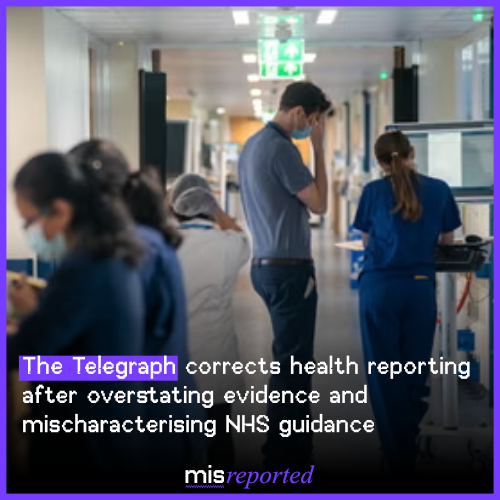
The Telegraph corrects health reporting after overstating evidence and mischaracterising NHS guidance
The Telegraph corrected two health articles after overstating the strength of evidence, presenting correlation as causation in reporting on toddlers’ screen time and speech development.
It also amended coverage that mischaracterised an informational NHS-linked article as official guidance endorsing cousin marriage, a claim that overstated institutional authority.
Taken together, the corrections highlight how nuance is often lost in health reporting, where simplifying complex evidence can mislead readers and undermine trust even when errors are later acknowledged.

The New York Times corrects obituary after mischaracterising Joel Habener’s role at Howard Hughes Medical Institute
The New York Times corrected an obituary of Dr. Joel Habener after misstating his relationship with the Howard Hughes Medical Institute.
The amendment clarified that he was a research investigator, not a Hughes fellow, between 1976 and 2006.
The error highlights how small institutional inaccuracies can subtly reshape perceptions of scientific standing, even in otherwise authoritative retrospective reporting.

The Guardian amends winter NHS overcrowding report after clarifying mortality figures
The Guardian corrected an NHS winter pressures article after clarifying that a mortality estimate attributed to last winter in fact covered the whole of 2024 and referred to delays before hospital admission.
The original framing risked implying a more direct and time-specific link between delayed discharges and reported deaths than the underlying analysis supported.
While pressures on hospitals remain acute, the episode highlights how imprecise use of statistics can amplify alarm and blur important distinctions in public health reporting.

The Guardian amends climate finance report after multiple corrections and clarifications
The Guardian revised its climate finance report after acknowledging that key institutions criticised in the article were not offered a right of reply prior to publication.
Sections of the article were removed or clarified after it became clear that certain examples were historically unrelated to the funds under scrutiny and that attribution in the headline was insufficient.
The episode underscores how reporting on complex policy areas can overextend the implications of advocacy research unless methodology, scope and institutional responses are clearly distinguished from the outset.

The New York Times amends report on F.D.A. vaccine inquiry after basic scientific error
The New York Times corrected its reporting on the F.D.A.’s expanded Covid vaccine inquiry after misstating that pertussis is caused by a virus rather than a bacterium.
The original framing embedded a basic scientific error in an article about vaccine oversight, undercutting the credibility of its coverage on a politically charged public-health issue.
That distinction matters, and misframing it risks undermining public trust, inflating narratives, or distorting accountability.

The New York Times corrects abortion statistics in coverage of Illinois clinic hub
The New York Times corrected its reporting on abortion access after misstating a national statistic in a feature on Carbondale, Illinois.
The original framing treated a figure limited to states without total bans as a nationwide total, altering how readers would assess the scale of abortion provision.
That distinction matters, and misframing it risks undermining public trust, inflating narratives, or distorting accountability.

CNN corrects global health funding report after misstatement on US aid reductions
CNN corrected its reporting on polio eradication funding, clarifying that US aid for polio has not been definitively cut and that future funding levels remain uncertain rather than settled.
The original framing suggested a clearer withdrawal by the United States than the facts supported, materially shaping how readers would interpret the funding gap.
That distinction matters, and misframing it risks undermining public trust, inflating narratives, or distorting accountability.

Opinion: The Birth Rate Crisis Is Being Misreported - And Everyone’s Falling for It
Few subjects attract more confident conclusions than falling birth rates. They are routinely framed as evidence of political neglect, social breakdown or inadequate family policy. The prescription follows quickly: expand parental leave, subsidise childcare, adjust tax credits. The logic is familiar, and reassuring. If governments act decisively, the numbers will recover.

WalesOnline clarifies A&E waiting time figure in report on emergency care delays
WalesOnline has clarified that the 12-hour A&E figure in its report referred to more than 10,000 patients who waited that long or longer in October, not to the average waiting time.
Previously, it stated that the average wait in emergency departments was 12 hours, when the actual mean was 2 hours 48 minutes.
That distinction matters, and misframing it risks overstating the scale of system-wide collapse, distorting public understanding of NHS performance in Wales and weakening confidence in legitimate scrutiny of emergency care pressures.

NPR clarifies administration method for new HIV-prevention drug
NPR has corrected its report on lenacapavir, clarifying that the HIV-prevention injection is administered in the abdomen or thigh, not the arm.
The administration route is central to training, logistics and patient uptake in early-rollout countries such as Eswatini and Zambia, where precision affects real-world delivery.
Even small inaccuracies can erode confidence in new public-health interventions, particularly during the fragile early stages of distribution.

The Telegraph corrects claim about NHS guidance on first-cousin marriage
The Telegraph has clarified that an NHS article about first-cousin marriage was educational, not formal guidance endorsing the practice.
Previously, it had reported that NHS guidance “highlighted the benefits” of first-cousin marriage.
That distinction matters, and misreporting it risks falsely attributing an official endorsement to the NHS on a culturally and medically sensitive subject.

Politico corrects major error on Obamacare premium hike figures
Politico has clarified that an individual earning $28,000 would face a 380 percent premium increase if Obamacare’s enhanced subsidies expire.
Previously, the outlet had misstated the size of the projected hike.
That distinction matters, and misreporting it risks misleading readers about the real financial impact of subsidy cuts on low-income Americans.

BBC issues belated correction over nuclear waste report in Lincolnshire village
The BBC has clarified that the planned nuclear waste facility in Lincolnshire is located offshore, with only the entrance and some tunnelling beneath the nearby village.
Previously, Look North reported that the dump itself was directly beneath the village.
That distinction matters, and misreporting it risks overstating the threat to residents and fuelling unnecessary local concern about the project’s location.

NPR corrects report on obesity drug approvals after misstating timeline of GLP-1 treatments
NPR has clarified that GLP-1 agonist drugs for obesity were first approved in 2014, not 2021 as previously reported.
Previously, the report implied that modern weight loss injections marked the first regulatory approval for this drug class.
That distinction matters, and misreporting it risks distorting the timeline of medical progress and overstating the novelty of the treatments driving recent public health improvements.

BBC corrects report on Haiti flooding death toll after overstating fatalities amid Hurricane Melissa coverage
The BBC has clarified that 23 people, not 40 as first reported, have died in Haiti following flooding linked to Hurricane Melissa.
Previously, it overstated the death toll based on early Associated Press figures.
That distinction matters, and misreporting it risks distorting the scale of the humanitarian disaster and fuelling unnecessary panic during already volatile conditions.

The Guardian corrects description of the Global Fund’s strategy in article on UK aid commitments
The Guardian has clarified that the Global Fund to Fight AIDS, Tuberculosis and Malaria is a financing and partnership organisation, not one based on vaccine distribution.
Previously, it described the fund as pursuing “vaccines-based strategies.”
That distinction matters, and misframing it risks distorting how global health initiatives operate and diminishing appreciation of the fund’s unique collaborative model for saving lives worldwide.

ABC corrects report on Healthscope tax break estimate
The Australian Broadcasting Corporation has clarified that the potential taxpayer cost of Healthscope’s proposed tax break scheme is uncertain.
Previously, it stated that the arrangement could cost up to $200 million in foregone revenue.
That distinction matters, and misframing it risks stirring needless alarm by presenting unverified projections as confirmed data, misleading readers about the true scale of the financial risk.

The Guardian walks back folate dosage error in autism drug story, highlighting confusion around FDA’s leucovorin move
The Guardian has issued a correction to its September 26 article, “What is leucovorin, the drug the FDA approved to treat autism?”, after misstating a key health recommendation and misidentifying a vitamin. The original piece claimed that the Centers for Disease Control and Prevention recommends 400 milligrams of folic acid daily for those who may become pregnant and referred to folate as “vitamin B”. The paper later clarified that the actual figure is 400 micrograms — one-thousandth of the reported dose — and that folate is vitamin B9.
The slip may seem technical, but in the context of autism and prenatal health it is substantial. Misreporting 400 micrograms as 400 milligrams inflates the safe intake level by a factor of 1,000, a discrepancy that could leave readers with a dangerously inaccurate impression.

NPR corrects autism report after overstating prevalence figures
NPR has issued a correction to its coverage of the White House announcement on acetaminophen and autism after misstating the prevalence of the condition.
In its original broadcast, the outlet reported that 1 in 3 children were diagnosed with autism. In fact, the correct figure is 1 in 31, or roughly 3%. The mistake was later clarified in an editor’s note attached to the segment.

The Guardian misreports on study linking air pollution to dementia
The Guardian recently ran a story on new scientific research that connects fine-particulate air pollution to Lewy body dementia, but its framing risks overstating certainty while downplaying context.
The study, led by researchers at Johns Hopkins University, examined data from 56.5 million US Medicare patients alongside controlled experiments in mice. It suggested that long-term exposure to PM2.5 particles — airborne matter smaller than 2.5 thousandths of a millimetre — could trigger misfolding of alpha-synuclein proteins in the brain, producing toxic clumps known as Lewy bodies. These are a hallmark of Lewy body dementia, the third most common form of dementia after Alzheimer’s disease and vascular dementia.

